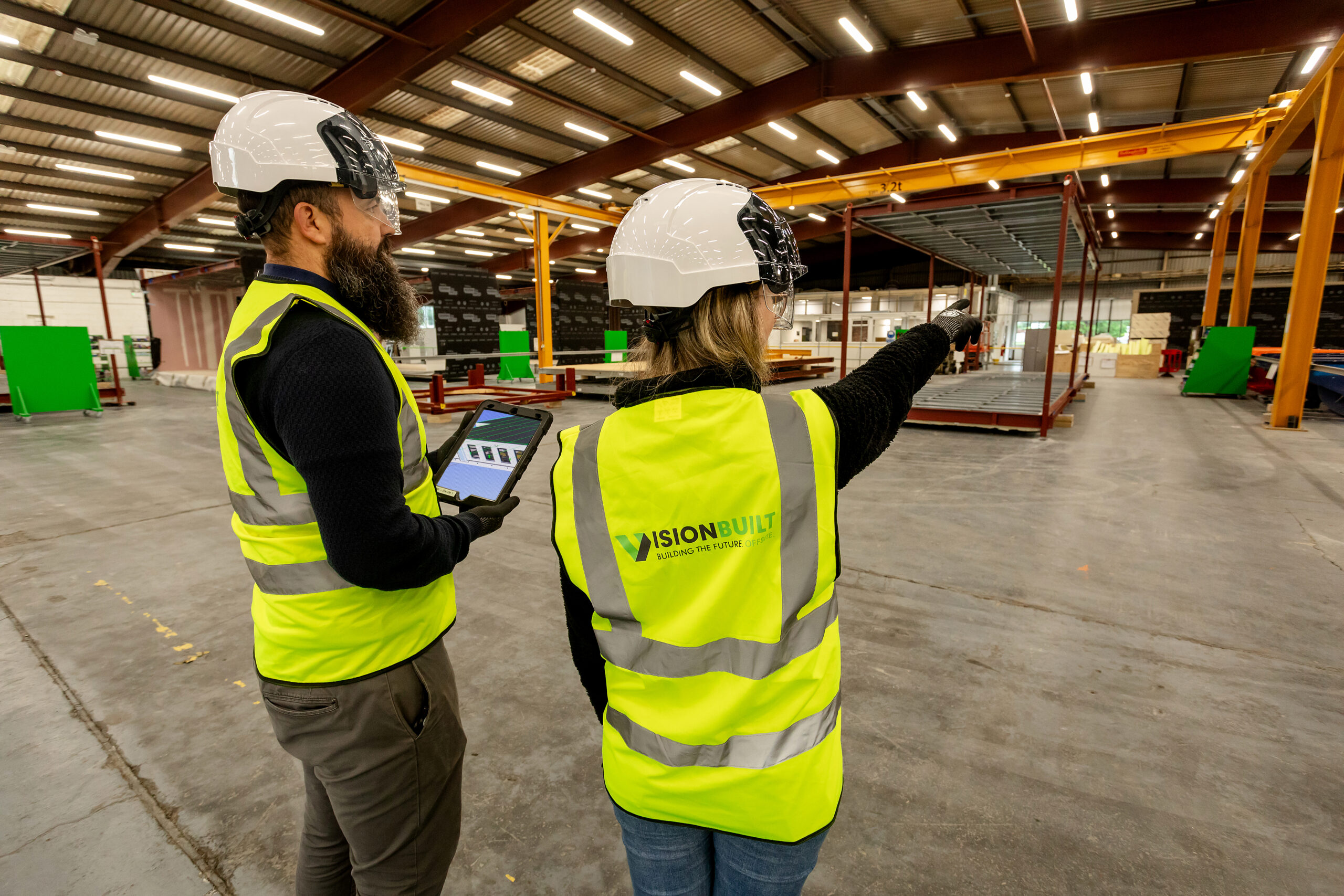Vision Built is helping to deliver the future of off-site construction, Photo: Sean Flynn
The Smart Off-site Association (SOSA), a constituent of the Construction Industry Federation, champions the advancement of off-site manufacturing in construction.
Representing companies with manufacturing capabilities, SOSA’s primary goal is to promote off-site methods and support its members.
As Vision Built’s Managing Director Brian Kennedy takes on the presidency, he shares his vision for the next year and the future of Modern Methods of Construction (MMC) in Ireland.
“The next 12 to 24 months are really important for the offsite construction industry here in Ireland. We have a substantial number of innovative off-site companies focused on quality, value and speed,” he says.
“As an industry we need to ensure that the market in Ireland and procurement strategy gives clarity to these companies regarding pipeline so that we take advantage of the capacity to deliver sustainably high-quality buildings.”
Brian is focused on the future of construction, emphasising the importance of expanding the market for MMC, which addresses the need for carbon reduction, scale, quality and the challenge of overcoming labour skill challenges.
“We need to leverage our industry’s large manufacturing capacity, particularly for health, education and residential sectors,” he says.
The association aims to create a collective body of manufacturing experts to advise and collaborate with public and private sectors on the capacity, quality, value and deliverability across various sectors.

Vision Built Managing Director and SOSA President Brian Kennedy
Brian highlights the necessity of robust public and private sector procurement policies to incentivise and mandate the use of both 3D volumetric and 2D panelised solutions with a focused and defined procurement route and market size for each solution.
He points out that different materials such as steel frame, timber frame and precast concrete each have their part to play.
While off-site construction has been around for decades, producing at scale has always been a challenge. There are now two key enablers that Brian sees as marking a shift in the industry that will allow MMC to deliver at scale.
“First, the capability to work in completely digital environments is there in the industry now through innovative technology and BIM where historically it was not,” he says.
“Secondly, companies across the country have invested in the facilities and capabilities to deliver high quality products at scale and meet the demand.”
One example of Vision Built’s own investment is the launch this September of a new traineeship, MMC using Off Site Assemblies, in partnership with LOETB at the National Construction Training Centre at Mount Lucas.
Equivalent to a level 4 on the NVQ framework, the programme is developed and delivered by T3 Training & Development Ltd, which is specific to the skills required for MMC and modular building.
The purpose is to provide a clear career path at all levels of the organisation, providing workers from diverse backgrounds the opportunity to grow their careers as MMC expands in Ireland.
The benefits of MMC are clear to Brian and these will enable the construction industry to deliver on the critical demand across multiple sectors.
Quality, scale, value and carbon reduction due to increased efficiencies in manufacturing environments are among the key benefits.
“We must now focus on ensuring there is a sustainable pipeline for off-site manufacturers to continue to invest and deliver for the market here in Ireland without having to export products to other jurisdictions,” he says.
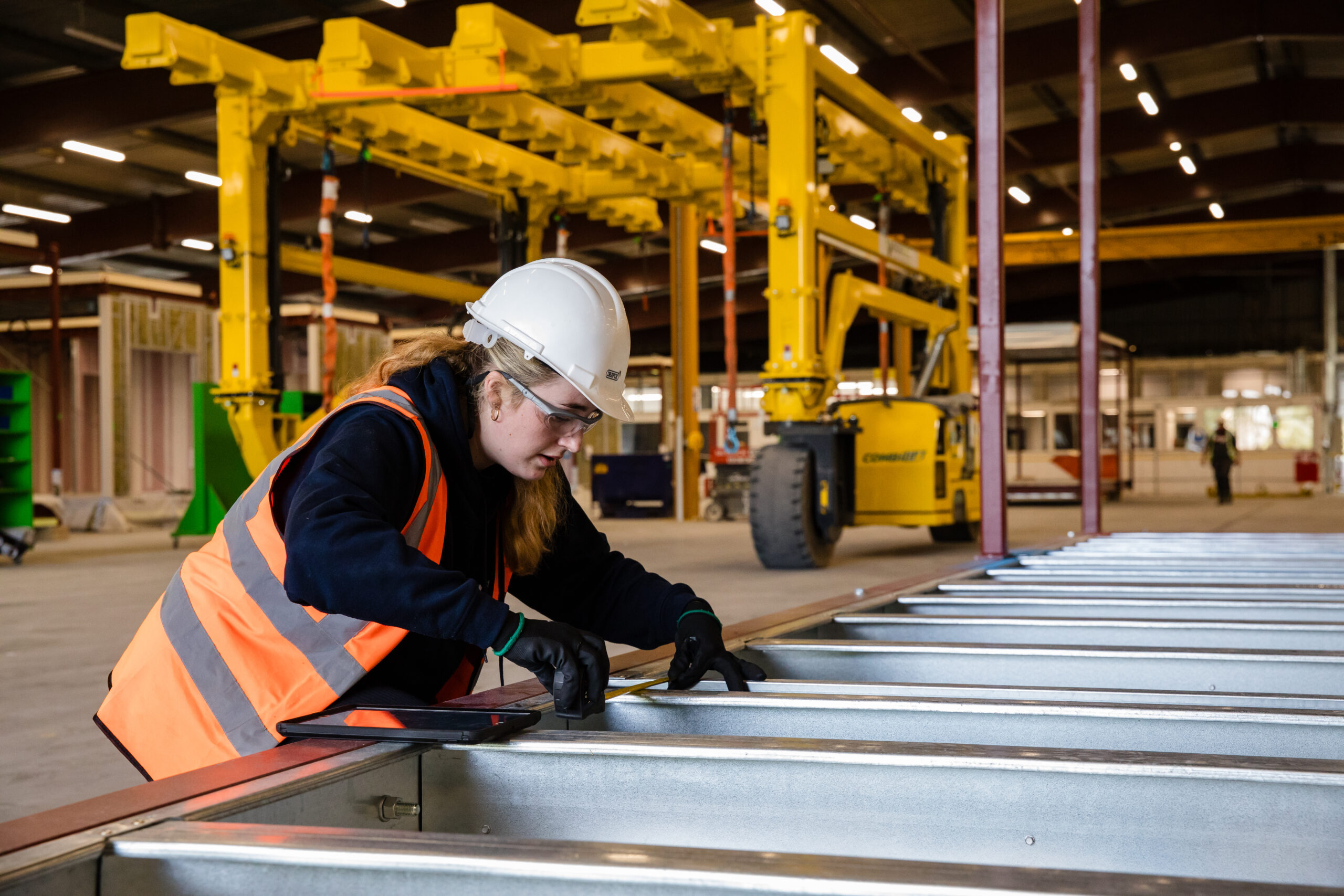
Giselle Gallagher, Vision Built Trainee Quality Assurance Technician, at work
Meet the trainee
Giselle Gallagher
Trainee Quality Assurance Technician, Vision Built
Giselle Gallagher, 20, has been working at Vision Built for a year, with her anniversary with the company being in August.
“I was born and raised in Tubbercurry and have lived here my whole life,” she says. That is except for the year she spent in America at Lindenwood University, Missouri, on a sports scholarship to play rugby.
“I went out there on a scholarship for psychology,” she says, with an original plan of possibly working towards sport psychology and team management. “That’s completely separate from what I’m doing now, but I couldn’t be happier.”
She adds: “When I started in the off-site construction industry, I was a bit apprehensive as it is a male-dominated industry. I thought I’d be just this 19-year-old girl without having huge input.”
But she quickly found her place within the company. “I realised we had a nice little network of women within the company who are extremely valued. I fitted in straight away, it was brilliant.”
Giselle is a Trainee Quality Assurance Technician at Vision Built, responsible for inspecting the products produced by the company. She checks every detail at each stage of the process to ensure everything meets the required specifications and quality standards.
Additionally, she is involved in the buildings once they are installed on-site, compiling detailed reports on their condition.

Giselle Gallagher
Initially, she joined Vision Built with the intention of filling a gap year, handing in her CV for a general operative position. But she quickly found the work fascinating.
“At first I didn’t know what I was looking at, but once I got out on the floor and could see the practical side, everything started to make sense.
“Since I started, the responsibility has gone up and up, and so has my learning. I’m still learning different things every single day,” she says.
Giselle starts a degree in Quality Management in September to broaden her knowledge and advance within her construction career.
“The industry is becoming more and more popular. There are so many future opportunities to work in the offsite manufacturing industry,” she says.
“Everything is always changing to ensure continuous improvement, and I absolutely love that,” she adds. “Don’t be afraid to do whatever it is you actually want to do because of the misconceptions or the stereotypes around it.
“If you want to do it, go and do it and be yourself. If they don’t appreciate you for being yourself where you work, there’s no point in staying.
“I just kind of took the jump and I landed on my feet with Vision Built. I couldn’t be happier.”
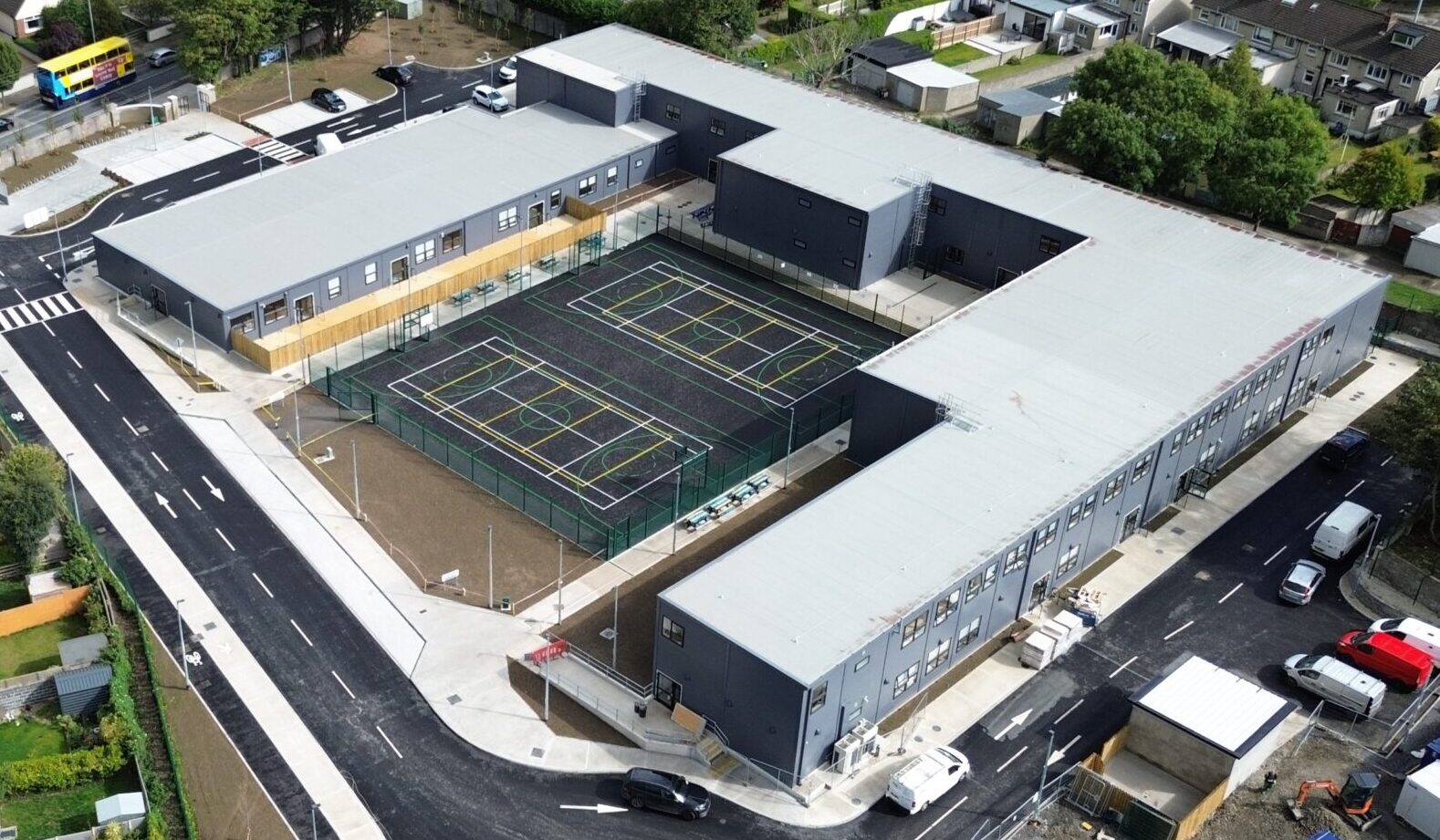
A Procon Modular project in Dublin for Goatstown Educate Together National School
Signing up to the modular academy
Mark Whitehead, the Construction Director at CPAC Modular Building Company, discusses the company’s growth and innovative steps towards the future of modular construction
“We’re building primarily for education at the minute, but we’re also in the healthcare and commercial sectors,” says Mark Whitehead. “We’ve grown significantly in the last three years.”
The advantages of modular construction are clear to CPAC Modular Building Company’s Construction Director.
“The big stuff is the speed and the quality of this product,” he says.
However, the industry is not without its challenges.
In particular he speaks to the challenges that face modular building, not unlike any other industry, in particular he says it is crucial to be aware that orders can slow down, creating gaps in production.
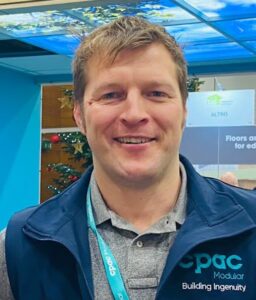
Mark Whitehead, Construction Director at CPAC Modular Building Company
“With modular construction and the frameworks that we’re on, there are, of course, challenges of not having a continuous pipeline of work,” he says.
“Ideally, I’d love to turn around now and say we’ve got three years in the pipeline and no gaps, but that’s not realistic.”
Effective management of the business has meant that CPAC Modular has been able not only to maintain a stable workforce but is also looking to create a pipeline of new talent.
In a significant move to foster talent and drive the modular construction industry forward, CPAC has launched the CPAC Academy, a new apprenticeship programme focusing on MMC.
“It’s a Level Seven Manufacturing Engineering apprenticeship, a three-year programme,” he says, describing how the advertisement of the apprenticeship drew huge interest “both internally and externally”.
Initially, two apprentices, one internal and one external, will undergo the programme, which includes 15 weeks of academic training each year at ATU in Galway.
During the apprenticeship, an in-house chartered structural engineer will mentor the apprentices through various aspects of manufacturing engineering, including quality, health and safety, as well as design.
“The idea is to give them a comprehensive understanding, from concept to handover,” says Mark.
“The big thing we’re trying to do at CPAC is lead the industry in quality standards,” he says.
“The CPAC Academy is about creating a pathway for people to advance their careers within the modular construction industry, from apprenticeships to potentially becoming project managers or even directors.”
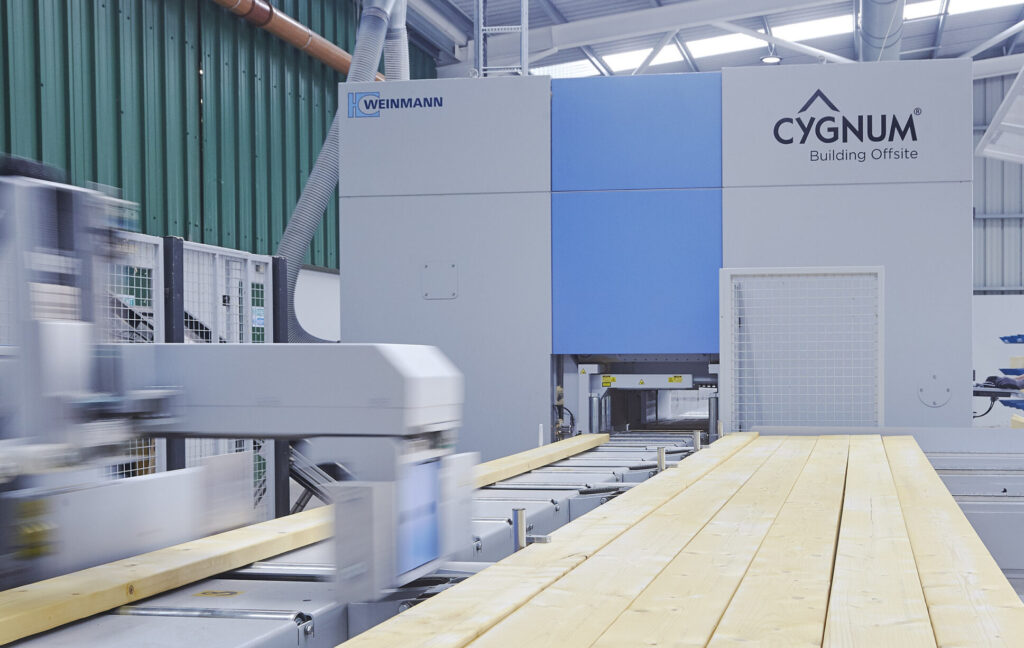
Building off-site with Cygnum

